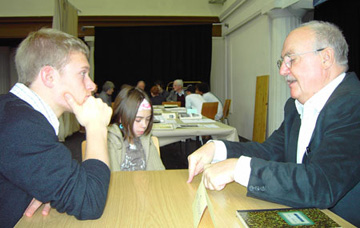Herr Rieddorf's Story
Life in Berlin During the War
WW2 Home | The Home Front
 Herr Rieddorf was just nine years old when the war broke out in 1939. He
led a hard life, with just one room for four people and his family often
didn't have enough to eat. He started school at six years of age but was
forced to leave after just three years to go to another school, which three
years later was turned into a soldier camp. This camp was very strict,
although none of the children were killed. There was a very structured daily
routine which included, exercising, cleaning their room and clothes, sewing
hour and school. The school was ten minutes away from the soldier camp and
the boys had to march there and back every day.
Herr Rieddorf was just nine years old when the war broke out in 1939. He
led a hard life, with just one room for four people and his family often
didn't have enough to eat. He started school at six years of age but was
forced to leave after just three years to go to another school, which three
years later was turned into a soldier camp. This camp was very strict,
although none of the children were killed. There was a very structured daily
routine which included, exercising, cleaning their room and clothes, sewing
hour and school. The school was ten minutes away from the soldier camp and
the boys had to march there and back every day.
Every morning, the Swastika was raised on a flag to represent the people's appreciation of Nazi Germany. Also, the discipline in the camp was very harsh. If your clothes on your shelf were not in a perfectly straight line, the Nazi officers would come along and throw them out of the window, into the snow. As well as this, if anybody talked at night, when they were supposed to be asleep, the guard would come in and say; "Right if you're not tired" and take the boys outside barefoot and in their pyjamas and made them walk around the building for ten minutes, this could happen in any weather and at any time of the year.
Herr Rieddorf was at this camp for three quarters of a year and after that he was evacuated to German-occupied Poland for a further three quarters of a year. In his school in Poland the teachers had the functions of a Nazi party and ran the school in this manner. He received little or no education during his time at this school as the normal teachers had been conscripted into the army.
After being in Poland, Herr Rieddorf returned to Berlin and started an apprenticeship at a National Socialist factory which repaired railway wagons. After this the bombs got more extreme and Herr Rieddorf was forced to quit his apprenticeship. There were air-raids day and night and in one incident everything around his house was destroyed.
As the intensity of the bombing increased, Herr Rieddorf and his family took refuge in a cellar in Berlin. As it was very difficult to leave the cellar they were always on the lookout for food. After being in the cellar for twelve days the Soviets arrived. Four officers came in and told them not to be afraid but that they had to leave the cellar immediately. After this they were all taken to another cellar under a shop. Here there were 15 - 16 people to a room and it was not uncommon for the Soviets to come and take the females as young as 14 away and kill them.
Due to the state the country was left in at the end of the war, there was no traffic on the roads, no running water and no electricity. It took years for the Allied forces to re-introduce all these things back into Germany. Herr Rieddorf also says that for 8-10 years after they were out of the cellar and his family were back in their apartment they could still smell the stench of death.
After this he started a second apprenticeship. The work was very hard and there was no food provided. Many people tried to get food from the countryside but it was very hard to get on a train. Sometimes people went around the houses in the village begging for something to eat. When anybody did manage to get food they would sometimes spend one or two nights carrying 20 pounds of potatoes.
Herr Rieddorf, as well as many others, was brainwashed into believing that the Jews were enemies of the system. And because of that the war was too dangerous for them. He believed that the Jews were being isolated but would be brought back when the war ended. Herr Rieddorf recalls when a family he knew just disappeared but nobody imagined that they had been killed.
In Berlin during the war there was only one newspaper and one broadcasting service. There was no unbiased background knowledge of what was happening in the world. Herr Rieddorf believes that as the majority of people were uneducated this led to many people believing Nazi propaganda. Hitler said they would build a new Germany and as Germany had no army or industry this made it easier for Hitler to rise to power. Also a propaganda programme was published and everybody was afraid until Hitler came with promises of a better country, so they all complied with his regime.
Herr Rieddorf also talked about Hitler's idea of a perfect woman. According to Hitler, women should have blonde hair, blue eyes and should play lots of sport. They should also be slim and stay at home to look after the children. There was an organisation of girls with blonde hair and blue eyes. They were all very slim and did gymnastics displays. Also on a container outside of a cellar where Herr Rieddorf stayed there was a slogan saying, "Hitlers will come and go, but the German people will stay forever."
As a child of the war, Herr Rieddorf believed in Hitler and saw him as someone to look up to. He says now that he feels very ashamed for doing this.
WW2 Home | The Home Front
Page last updated: 25th February 2014
